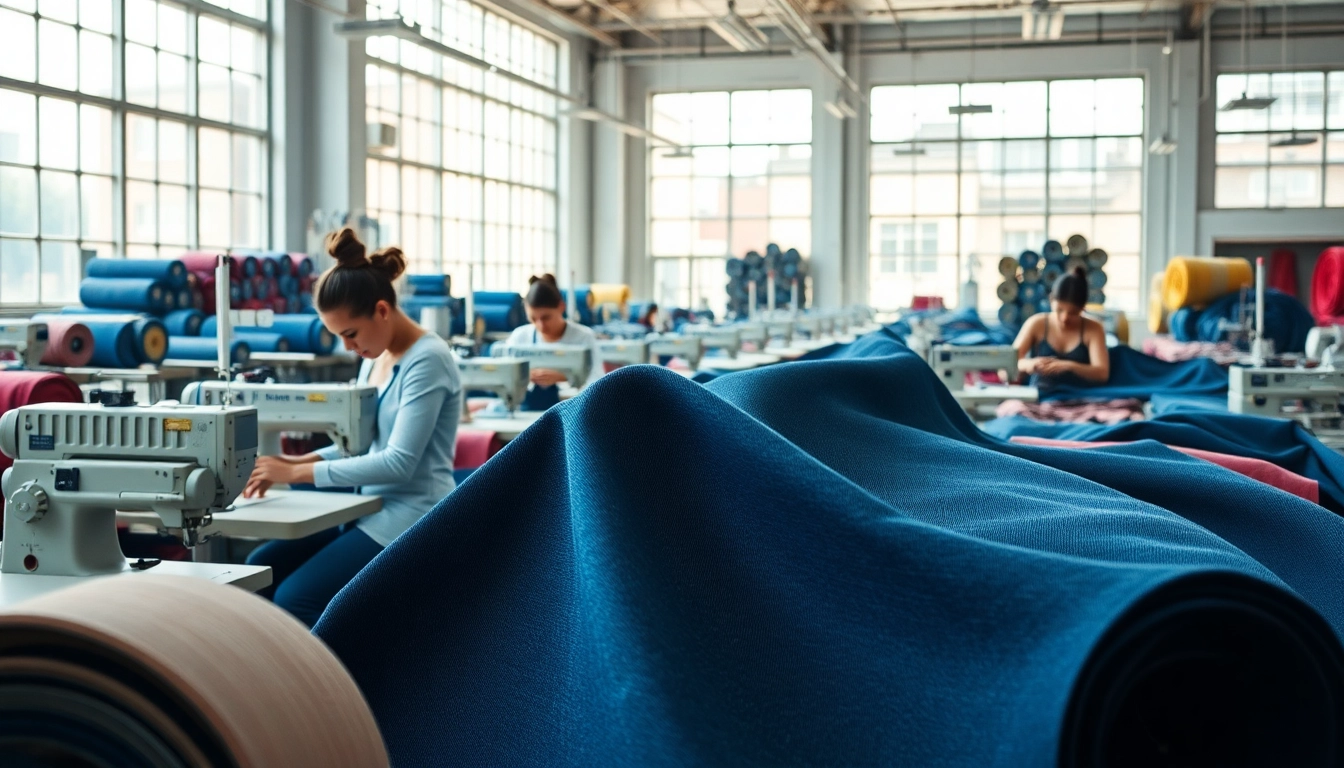Understanding the Role of Jeans Cloth Manufacturers
The world of fashion heavily relies on textiles, and few items have become as globally ubiquitous as denim. Understanding the role of jeans cloth manufacturers is crucial for anyone interested in fashion production, especially in the denim sector. These manufacturers play a pivotal role in shaping not only the fabric and styles we wear but also the trends we develop and follow in the market.
The History of Denim Manufacturing
Denim, originally created as a sturdy fabric for workwear, has evolved into a fashion staple. The history of denim manufacturing can be traced back to the 17th century in France, where the fabric was originally called “serge de Nîmes,” meaning “serge from Nîmes.” Fast forward to the 19th century, denim gained popularity in America, especially during the Gold Rush, when Levi Strauss and Jacob Davis invented the riveted jean, making it durable enough for the working population.
As industrialization took hold, denim manufacturing underwent significant transformations. Factories began to automate production processes, leading to faster and more efficient fabrication of denim jeans. Over time, denim transitioned from being merely functional workwear to becoming a global fashion phenomenon. Today, denim is produced in diverse ways and embraced in myriad styles, and it is manufactured using several techniques adapted to modern needs.
Key Processes in Jean Production
The production of jeans involves several intricate steps that transform raw cotton into the stylish and durable garments we wear today. Key processes include:
- Fiber Selection: The journey begins with fiber selection. Manufacturers often choose between different types of cotton or blends with synthetic fabrics to enhance durability and elasticity.
- Weaving: Denim is usually woven in a twill fashion, which gives it its characteristic diagonal ribbing. This process is critical because it determines the fabric’s durability and feel.
- Dyeing: Indigos and other dyes are most commonly used in creating denim’s unique colors. The dyeing process can affect the final texture and appearance, making it a crucial design choice.
- Finishing: The finishing process includes washing, distressing, and adding any final treatments for aesthetic appeal. This step might involve techniques such as stone washing or sandblasting to give jeans their worn-in look.
- Cutting and Sewing: Once the denim is ready, it is cut into pattern pieces and sewn together using robust stitching that can withstand wear and tear.
- Quality Control: The final stage ensures that each pair meets the manufacturer’s standards regarding size, seam integrity, and overall finish.
Importance of Quality Control
Quality control is essential in the manufacturing process. It ensures compliance with industry standards, reduces waste, and enhances consumer satisfaction. Effective quality checks include evaluating the fabric for defects, ensuring the correct fit through precise measurements, and assessing sewing quality to prevent unraveling or poor stitching. Manufacturers who prioritize quality control often gain a reputation for reliability, resulting in higher sales and sustained partnerships.
Identifying Reputable Jeans Cloth Manufacturers
Choosing the right jeans cloth manufacturer is a critical decision for any fashion brand or retailer. Not only does it affect production quality, but it also impacts the brand’s reputation and its ability to meet market demands. Below are key considerations for identifying reputable manufacturers in this domain.
What to Look for in a Manufacturer
When selecting a jeans cloth manufacturer, consider the following attributes:
- Experience: A manufacturer with a long history in denim production generally has a wealth of knowledge about fabric technology, industry standards, and market demands.
- Range of Services: Look for manufacturers who provide comprehensive services—design, pattern making, and finishing—rather than just fabric production.
- Customization Options: Many brands today seek to provide unique products. A reputable manufacturer should be willing to accommodate custom fabric designs, washes, and fits.
- Transparent Practices: Verify that the manufacturer practices transparency regarding pricing, labor practices, and production timelines.
Evaluating Manufacturer Credentials and Certifications
Another important aspect is evaluating a manufacturer’s credentials and certifications. Look for certificates that reflect compliance with labor laws, environmental regulations, and industry standards such as ISO certifications. Additionally, certifications related to ethical manufacturing practices may also be significant, reflecting a commitment to sustainable fashion.
Common Red Flags to Avoid
While searching for the right manufacturer, be mindful of potential red flags. Key warning signs may include lack of clear communication, inconsistent production quality, poor customer service, and absence of certifications. These issues can negatively affect not only production timelines but also the final quality of the jeans.
Current Trends Influencing Jeans Cloth Manufacturers
The denim industry is dynamic and continually evolving. Staying informed about current trends can give manufacturers a competitive edge. Here are some prominent trends currently influencing the jeans cloth manufacturing sector.
Eco-Friendly Practices in Denim Production
Rising environmental concerns have prompted many manufacturers to adopt eco-friendly practices. Processes such as waterless dyeing, organic cotton sourcing, and sustainable washes are becoming increasingly popular. Brands that embrace sustainability not only appeal to eco-conscious consumers but also contribute positively to the environment.
The Rise of Customization in Jeans
Customization in fashion is well on the rise, and denim is not an exception. Consumers are eager to express individuality, which has led to a demand for personalized jeans. Manufacturers that offer bespoke services, such as tailored fits, unique wash treatments, and customizable embellishments, can seize opportunities in this growing market.
Innovative Fabrics and Technologies
Technology is making significant strides in the denim production process, from advanced weaving techniques to the integration of smart textiles. Innovations such as stretchable denim or moisture-wicking properties are becoming essential for modern consumers. Staying ahead with such trends can empower manufacturers to produce cutting-edge products that appeal to tech-savvy consumers.
Building Successful Partnerships with Jeans Cloth Manufacturers
Establishing successful partnerships with jeans cloth manufacturers requires more than just a business agreement; it involves nurturing a productive relationship that can benefit both parties. Here are strategies for achieving effective partnerships.
Effective Communication Strategies
Open and effective communication is foundational to successful partnerships. Regular updates on production, timely responses to inquiries, and transparent feedback mechanisms can greatly enhance collaboration. Utilizing collaborative tools such as project management software can streamline communication and ensure both parties stay aligned on goals and expectations.
Negotiating Contracts and Pricing
Negotiating fair contracts is essential to maintaining profitability while ensuring quality. It’s important to establish clear terms regarding lead times, pricing structures, delivery schedules, and quality benchmarks. Consider consulting with legal experts to draft comprehensive contracts that protect both parties’ interests.
Establishing Long-Term Relationships
Building long-term relationships with manufacturers can foster stability and loyalty. Consistent collaboration on projects allows for increased trust and an understanding of each other’s operational nuances. Additionally, long-term partnerships can provide better negotiation leverage, pricing stability, and guarantee quality consistency over time.
Performance Metrics for Evaluating Manufacturers
Evaluating the performance of jeans cloth manufacturers is crucial to ensure not only quality but also seamless production processes. Establishing clear metrics helps in maintaining accountability and achieving sustainability.
Key Performance Indicators for Quality
Key performance indicators (KPIs) for assessing quality performance should include defect rates, customer returns, and adherence to specifications. Monitoring these indicators provides valuable insights into manufacturers’ operational efficiency and product quality levels.
Assessing Delivery Timeliness
The ability of a manufacturer to deliver products on time is crucial for any business operation. Developing metrics to measure delivery timelines against agreed schedules helps maintain project timelines and can significantly influence a brand’s overall inventory management and customer satisfaction.
Customer Feedback and Satisfaction
Lastly, gathering customer feedback and assessing satisfaction provides a direct line to understanding the product’s reception in the market. Regular surveys and direct communications can yield actionable insights, helping manufacturers align their practices to better meet consumer expectations and preferences.


